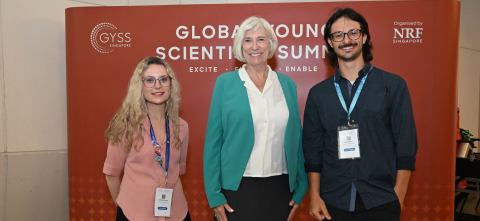
Spartans Making a Difference: (Dis)closing the Water Gap
MSU researchers, in collaboration with the nonprofit DigDeep and the Matrix: Center for Digital Humanities & Social Sciences at MSU have created a national dashboard to better address water and sanitation access in the U.S.

Kieron Moller – Agricultural Resilience
Kieron Moller received his PhD in December 2025 from the Department of Biosystems & Agricultural Engineering. His research focuses on improving agricultural resilience in low- and middle-income countries, using Senegal as a case study.

Leo Baldiga – Water Management and Agricultural Technology
Leo Baldiga is a third-year PhD student in the Department of Geography, Environment, and Spatial Sciences. His research bridges social science, water management, and emerging agricultural technologies, with a focus on Southeast Asia.

Katherine McCullen – Phytoremediation Using Duckweed
Katherine McCullen is a PhD student in the Department of Biosystems & Agricultural Engineering. Her research involves the use of duckweed, an aquatic plant, as a phytoremediator, removing contaminants from the environment.

Marinna Guzy – Great Lakes Fisheries and Indigenous Knowledge
Marinna Guzy is a doctoral student in the Department of Fisheries and Wildlife with a dual major in Environmental Science and Policy. One aspect of her research focuses on building relationships with the Bay Mills Indian Community.

Autumn Bland – Water Access
Autumn Bland is a second-year PhD student in the Department of Sociology. Her research examines household and individual water access, including access to plumbing and basic water infrastructure.

Rui Li – PFAS in Agriculture
Rui Li is a PhD student in the Department of Plant, Soil and Microbial Sciences. Her research uses machine learning to study soil and crop systems.

Angelique Willis – Drinking Water Quality and Public Health
Angelique Willis is a dual PhD student in Geography and Environmental Science and Policy. Her research centers drinking water quality and public health outcomes, with a specific focus on environmental justice and underserved communities.

Greg Rouland – Wastewater and Soil Management
Greg Rouland is a PhD student in the Department of Biosystems & Agricultural Engineering. Using a machine called the tTEM, he collects data on soil resistivity across fields, which helps to determine where wastewater can be applied most effectively.

Andrew Chesang – Precision Agriculture
Andrew Chesang is a doctoral student in the Department of Biosystems & Agriculture Engineering. His research uses robots, 3D imaging, and in-field sensors to help farmers manage their apple orchards throughout the year.

MSU packaging assistant professor Yoorae Noh explains the human health implications of micro- and nanoplastics
Dr. Yoorae Noh has spent her career investigating plastics, microplastics, and the emerging concern of nanoplastics.

WaterCube NRT Fellows Attend Global Young Scientists Summit in Singapore
WaterCube NRT Fellows Autumn Bland and Leo Baldiga participated in the Global Young Scientists Summit (Jan 5–9).
